The latest Education Library Collection Spotlight highlights books with the theme of Inquiry as the educational approach.
Inquiry-based learning emphasizes active student engagement and critical thinking. Rooted in curiosity, it encourages learners to ask questions, investigate topics, and construct their own understanding of the subject matter. Through the process of inquiry, students develop problem-solving skills, enhance their ability to gather and analyze information, and cultivate a sense of ownership over their learning. This approach fosters a dynamic classroom environment where students not only acquire knowledge but also develop the skills necessary for lifelong learning and independent exploration.
UBC Education Library’s Inquiry-Based Teaching and Learning booklists are separated by grade level:
Elementary Grades (K- Grade 6)
Middle Years and Secondary Grades (Grades 7-12)
Picture Books for Inquiry-Based Learning
The following list contains professional resources for teachers, picture books, and ebook highlights from our collection:
Resources for teachers
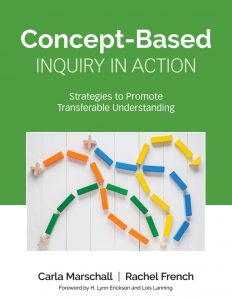 Concept-based inquiry in action: strategies to promote transferable understanding / Carla Marschall and Rachel French; foreword by H. Lynn Erickson and Lois A. Lanning; illustrations by Andrea Mosteller.
Concept-based inquiry in action: strategies to promote transferable understanding / Carla Marschall and Rachel French; foreword by H. Lynn Erickson and Lois A. Lanning; illustrations by Andrea Mosteller.
LB1027.23 .M27 2018
“All students deserve the opportunity to think conceptually. But seeing conceptual relationships does not come naturally to every student. How can teachers construct thinking classrooms where students can move from the factual to the conceptual level of thinking? Concept-Based Inquiry in Action has the answers.
In this book, Carla Marschall and Rachel French marry theory with practice to create a new framework for inquiry that promotes deep understanding: Concept-Based Inquiry. The key is helping students inquire into concepts and the relationships between them using guiding questions developed by the teacher, by the students themselves, or by the teacher and students together.
Step by step, the authors lead both new and experienced educators to implement teaching strategies that support the realization of inquiry-based learning for understanding in any K-12 classroom.”
.
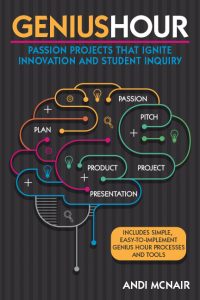 Genius hour: passion projects that ignite innovation and student inquiry / by Andi McNair.
Genius hour: passion projects that ignite innovation and student inquiry / by Andi McNair.
LB1027.25 .M37 2017
Genius Hour provides educators with the tools that they need to successfully implement genius hour, or passion projects, in the classroom.
Presented through an easy-to-follow six-step strategy, teachers will utilize the six P’s-passion, pitch, plan, project, product, and presentation-as a map for students to follow as they create, design, and carry out projects.
Students will experience personalized learning through these self-driven projects, application of standards and real-world skills, and opportunities to learn through failure and reflection.
The book includes handouts, suggested online resources, and tips and tricks to make the genius hour process meaningful for students and manageable for educators, as well as a discussion of genius hour’s importance and impact on gifted students as they take ownership of their own learning.
.
.
.
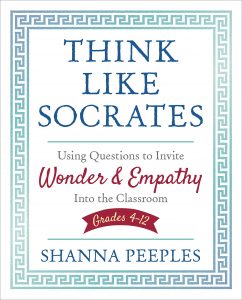 Think like Socrates: using questions to invite wonder and empathy into the classroom, grades 4-12 / Shanna Peeples.
Think like Socrates: using questions to invite wonder and empathy into the classroom, grades 4-12 / Shanna Peeples.
LB1027.44 .P43 2018
Socrates believed in the power of questions rather than lecturing his students.
But how did we get so far away from his method of inquiry? Shanna Peeples, 2015 National Teacher of the Year, will show you how teachers can create an engaging atmosphere that encourages student questions and honors their experiences.
This resource provides
- Questions paired with sample texts
- Step-by-step lessons for generating and using students’ questions
- Lesson extensions for English language learners, special education students, and gifted and talented students
- Writing suggestions, in-class debate questions, and scoring rubrics
- Multimedia texts
- Protocols for using inquiry with adults as a base for professional development
.
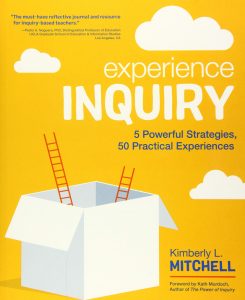 Experience inquiry: 5 powerful strategies, 50 practical experiences / Kimberly L. Mitchell; foreword by Kath Murdoch.
Experience inquiry: 5 powerful strategies, 50 practical experiences / Kimberly L. Mitchell; foreword by Kath Murdoch.
LB1027.23 .M57 2019
“A book that offers fifty inquiry experiences so that teachers can teach in an inquiry-based way”–
Plenty of resources speak to the benefits of inquiry, the research behind it, and even subject-specific processes to follow. But that’s not enough. Implementing inquiry is the tricky part, and involves changing beliefs about the teacher and student roles in the classroom.
The strategies and experiences in this book improve your relationships with students and colleagues, reduce your workload by asking more of students, and breathe joyful curiosity back into your classroom.
One part practical guide, one part interactive journal, this book provides the opportunity to do inquiry as you read about it.
You’ll learn what inquiry-based instruction looks like in practice through five key strategies, all of which can be immediately implemented in any learning environment.”
.
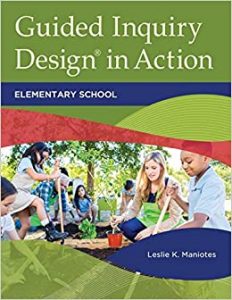 Guided inquiry design in action: elementary school / Leslie K. Maniotes; preface by Carol C. Kuhlthau.
Guided inquiry design in action: elementary school / Leslie K. Maniotes; preface by Carol C. Kuhlthau.
LB1060 .M326 2018
“One of three needed for district-wide implementation of GID at all levels, K-12, this book provides an introduction to an educational method that embeds information literacy into content areas and encourages students to acquire a more intimate knowledge of subjects through asking questions and conducting more thorough research.
Intended to be used alongside Guided Inquiry Design(R), lessons are laid out using the GID session plan templates from Guided Inquiry Design(R).
Readers can implement these lessons as they are or use them as models in designing their own, similar units customized for their own local or school population and to meet relevant standards and content.
Included in these lesson plans are lessons created by educators for increased student interaction that enhance the elementary educator’s ability to instruct younger students using the GID process.”
.
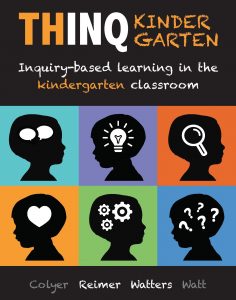 THINQ Kindergarten: inquiry-based learning in the kindergarten classroom / authors Joan Reimer and Deb Watters.
THINQ Kindergarten: inquiry-based learning in the kindergarten classroom / authors Joan Reimer and Deb Watters.
LB1027.23 .R46 2017
“THINQ Kindergarten, Inquiry-based learning in the kindergarten classroom, offers a readable and accessible overview of the big ideas of inquiry and applies them to the unique characteristics and needs of kindergarten learners, teachers and classrooms.
Chapters:
1) Inquiry-based learning in kindergarten,
2) Wondering and questioning,
3) Creating an inquiry environment,
4) Negotiating the curriculum,
5) Documentation,
6) Inquiry assessment in kindergarten,
7) Final thoughts”
.
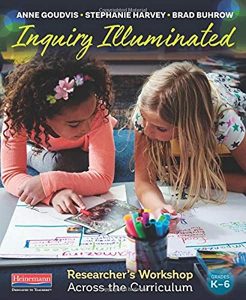 Inquiry illuminated: researcher’s workshop across the curriculum / Anne Goudvis, Stephanie Harvey, Brad Buhrow with Karen Halverson; Photography by Ehren Joseph.
Inquiry illuminated: researcher’s workshop across the curriculum / Anne Goudvis, Stephanie Harvey, Brad Buhrow with Karen Halverson; Photography by Ehren Joseph.
LB1027.23 .G683 2019
To immerse students in the richness and intrigue of the content areas, let the kids lead the way!
In Inquiry Illuminated, Anne Goudvis, Stephanie Harvey, and classroom teacher Brad Buhrow shine a light on researcher’s workshop-an approach whose true north emerges from kids’ curiosity. Adapting structures you already know from reader’s and writer’s workshop, they share a predictable, proven, and-most importantly-authentic approach that:
- creates irresistible investigations in science, history and social studies, or language arts
- increases students’ independence and agency by gradually releasing responsibility for inquiry
- effectively integrates literacy and content through strategies for comprehension and critical thinking.
With copious full-color photographs and classroom video, Inquiry Illuminated shows how to create a culture where thoughtfulness, creativity, and collaboration can turn wonder into powerful inquiry. Then, with researcher’s workshop, you’ll uncover a process that transforms curiosity into opportunities to ask questions and follow a path to new understandings. Throughout you’ll discover how to bring in what you already do in reader’s and writer’s workshop to support students’ investigations as they read, write, create, and take action.
.
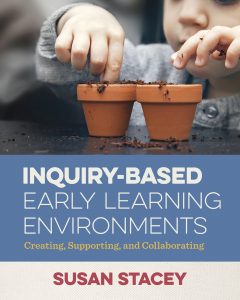 Inquiry-based early learning environments: creating, supporting, and collaborating / Susan Stacey.
Inquiry-based early learning environments: creating, supporting, and collaborating / Susan Stacey.
LB1139.23 .S727 2019
“What does it mean to inquire? Grownups would say it means to question, to search for information, or to find out about a topic of interest. For children in an early childhood classroom, the definition is no different. From the time of their birth, children want to know how the world works and actively seek out information. How educators respond to their questions is what this book is all about.
Inquiry-Based Early Learning Environments takes an in-depth look at children’s inquiry. What does inquiry look like in early childhood settings? How does the environment affect children’s inquiries and teachers’ thought processes? Inquiry-Based Early Learning Environments examines inquiry in all its facets, including environments that support relationships, that create a culture of risk-taking in our thinking, that support teachers as well as children, that include families, that use documentation as a way of thinking about our work, and of course, the physical environment and all the objects and spaces within it. Throughout, stories about environments and approaches to inquiry from around the world are included as examples.”
.
.
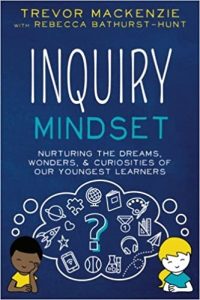 Inquiry mindset: nurturing the dreams, wonders, & curiosities of our youngest learners / Trevor MacKenzie with Rebecca Bathurst-Hunt.
Inquiry mindset: nurturing the dreams, wonders, & curiosities of our youngest learners / Trevor MacKenzie with Rebecca Bathurst-Hunt.
LB1027.44 .M27 2018
From their youngest years, our children are innately curious. They explore the world around them through play, imagination, and discovery. They build meaning, they create understanding, and they unabashedly share their learning. It’s in this process that they find joy in life and relevance in the world around them.
Why, then, do some of our students become disconnected from their learning in school? Where does this natural curiosity go? And how, as educators, can we ensure all of our students experience a meaningful and wonder-filled journey through their education?
It’s these questions that Trevor MacKenzie, author of the critically acclaimed book Dive into Inquiry, answers in Inquiry Mindset. Co-written with kindergarten teacher Rebecca Bathurst-Hunt, Inquiry Mindset offers a highly accessible journey through inquiry in the younger years. You’ll learn how to . . .
- Empower your learners, increase engagement, and accelerate achievement.
- Harness the wonderings and curiosities of your students and leverage them into powerful learning opportunities.
- Cultivate an inquiry mindset both as a teacher and in your students
- Adopt an inquiry approach that results in the most authentic and inspiring learning you’ve ever experienced
Picture books used to introduce students to Inquiry-Based Learning
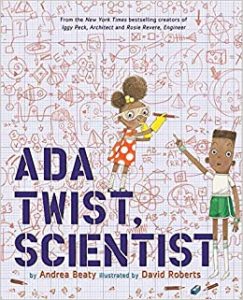 Ada Twist, scientist / by Andrea Beaty; illustrated by David Roberts.
Ada Twist, scientist / by Andrea Beaty; illustrated by David Roberts.
PZ8.3.B38447 Ad 2016
“Inspired by real-life makers Ada Lovelace and Marie Curie, this beloved #1 bestseller champions STEM, girl power and women scientists in a rollicking celebration of curiosity, the power of perseverance, and the importance of asking “Why?”
Ada Twist’s head is full of questions. Like her classmates Iggy and Rosie–stars of their own New York Times bestselling picture books Iggy Peck, Architect and Rosie Revere, Engineer–Ada has always been endlessly curious.
Even when her fact-finding missions and elaborate scientific experiments don’t go as planned, Ada learns the value of thinking her way through problems and continuing to stay curious.”
.
.
.
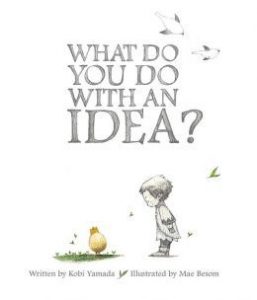 What do you do with an idea? / written by Kobi Yamada; illustrated by Mae Besom; designed by Sarah Forster; edited by M.H. Clark & Amelia Riedler; creative direction by Julie Flahiff.
What do you do with an idea? / written by Kobi Yamada; illustrated by Mae Besom; designed by Sarah Forster; edited by M.H. Clark & Amelia Riedler; creative direction by Julie Flahiff.
PZ7.Y18 Wh 2013
What do you do with an idea? Especially an idea that’s different, or daring, or a little wild?
This is the story of one brilliant idea and the child who helps to bring it into the world.
It’s a story for anyone, at any age, who’s ever had an idea that seemed too big, too odd, too difficult.
It’s a story to inspire you to welcome that idea, to give it space to grow, and to see what happens next.
What Do You Do With an Idea? has won several awards, including the Independent Publisher’s Book Gold Award, the Washington State Book Award, and the Moonbeam Children’s Book Award.
.
.
.
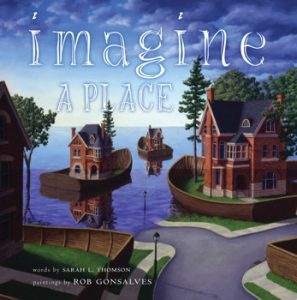 Imagine a place / words by Sarah L. Thomson; paintings by Rob Gonsalves.
Imagine a place / words by Sarah L. Thomson; paintings by Rob Gonsalves.
PZ4.9.T3772 Im 2008
If you can imagine a place, you can go there.
“Imagine a place that makes you feel as free as a bird. Imagine a place where getting there is worth whatever it takes.
Imagine a place that makes you feel like it’s always been your destination. Imagine a place made out of pure imagination.
Imagine a Place is a gorgeous companion to the critically acclaimed Imagine a Night and Imagine a Day, and reminds us that imagination is powerful enough to take us anywhere we want to go.
And Rob Gonsalves’s exquisitely conceived paintings leave you in awe…of his imagination.”
.
.
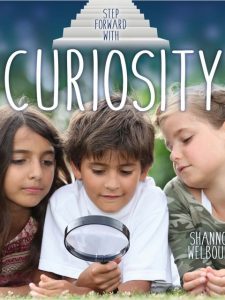 Step forward with curiosity / Shannon Welbourn.
Step forward with curiosity / Shannon Welbourn.
BF723.C8 M55 2017
“Without curiosity, we may never have known the world’s greatest inventions or discovered its most amazing places.
This empowering title offers helpful ideas, practical tips, and inspiring stories about how being curious about the world around you can help you reach your goals.
Inspirational stories of individuals show how their curiosity led them to regularly ask questions and seek answers leading them to uncover new and exciting things.
Learn how to make curiosity a habit that will help you step forward.”
.
.
.
.
.
.
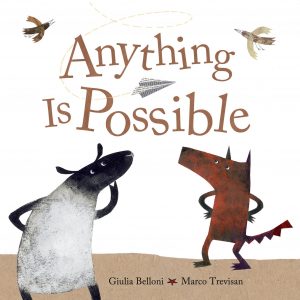 Anything is possible / Giulia Belloni, Marco Trevisan.
Anything is possible / Giulia Belloni, Marco Trevisan.
PZ10.3.B45 An 2013
“The sheep in this story is a dreamer, while her friend the wolf has a more practical disposition.
One day the sheep runs to the wolf with an idea. She wants to build a flying machine!
But the wolf tells her it’s impossible.
Eventually, however, the sheep’s dream gets the better of the wolf’s doubts, and they begin to work on the project together.
Through perseverance and the process of trial and error, the sheep and wolf manage to create a winning design, brought to life by architecturally and mathematically inspired paper collage art.
At the end of this whimsical tale, even the wolf has to admit that anything is possible!”
.
ONLINE Inquiry books
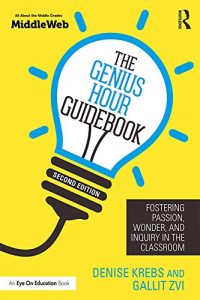 The genius hour guidebook: fostering passion, wonder, and inquiry in the classroom by Denise Krebs, Gallit Zvi.
The genius hour guidebook: fostering passion, wonder, and inquiry in the classroom by Denise Krebs, Gallit Zvi.
LB1027.23 .K735 2020
“Promote your students’ creativity and get them excited about learning! In the second edition of this popular, practical book, authors Denise Krebs and Gallit Zvi show you how to implement Genius Hour, a time when students can develop their own inquiry-based projects around their passions and take ownership of their work. Brought to you by MiddleWeb and Routledge Eye On Education, the book takes you step-by-step through planning and teaching Genius Hour. You’ll learn how to guide your students as they: inspire learning and brainstorm wonders; develop inquiry questions based on their interests; conduct research and experiments about their topic of choice; create presentations to teach their fellow students in creative ways; and present their finished product for a final assessment. This edition includes new chapters on managing your classroom projects and recommended books. Throughout the book you will find voices from the Genius Hour community sharing real life stories and inspiration. Appendices contain handy FAQs and ready-made lessons and resources. In addition, a companion website, www.geniushourguide.org, offers bonus materials and regular updates to support you as you implement Genius Hour in your own classroom”
.
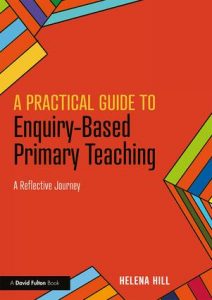 A practical guide to enquiry-based primary teaching: a reflective journey / Hellen Hill.
A practical guide to enquiry-based primary teaching: a reflective journey / Hellen Hill.
LB1556.7.G7 H55 2019
“A Practical Guide to Enquiry-Based Primary Teaching is a practical guide for developing an enquiry approach in primary schools.
It is intended for use by the primary practitioner as a thinking diary to nurture the skills required to be a successful, confident teacher and to support the school’s development.
The book provides space for the practitioner to record highs and lows in the classroom and experiences in meetings and training, ensuring it serves as a personal record of what works well but also a pertinent reminder of what can improve and what to learn from mistakes. This book is a bespoke journal which will be a valuable daily aid for primary teachers”
.
.
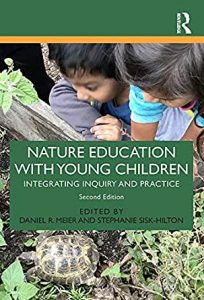 Nature Education with young children: integrating Inquiry and Practice / edited by Daniel R. Meier and Stephanie Sisk-Hilton.
Nature Education with young children: integrating Inquiry and Practice / edited by Daniel R. Meier and Stephanie Sisk-Hilton.
LB1140.5.S34 N38 2020
“Now in a fully updated second edition, Nature Education and Young Children remains a thoughtful, sophisticated teacher resource that blends theory and practice on nature education, children’s inquiry-based learning, and reflective teaching. Reorganized to enhance its intuitive flow, this edition features a Foreword by David Sobel and three wholly new chapters examining nature and literacy in kindergarten, outdoor play and children’s agency in a forest school, and the power of nature inquiry for dual language learners. Revised to reflect the latest research and guidelines, this book offers a seamless integration of science concepts into the daily intellectual and social investigations that occur in early childhood. With a fresh framing of nature exploration in the context of our current educational landscape, this text is a comprehensive guide for educators and students looking to introduce and deepen connections between nature education and teacher inquiry and reflection”
.
.
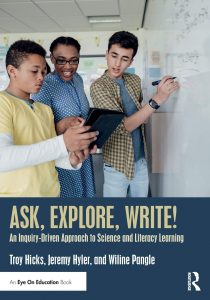 Ask, explore, write: an inquiry-driven approach to science and literacy learning / Troy Hicks, Jeremy Hyler, Wiline Pangle.
Ask, explore, write: an inquiry-driven approach to science and literacy learning / Troy Hicks, Jeremy Hyler, Wiline Pangle.
Q225.5 .H53 2020
“Learn how to effectively incorporate literacy instruction into your middle or high school science classroom.
This practical book presents ten innovative strategies you can use to improve students’ abilities to read and write various types of scientific nonfiction, including argument essays, informational pieces, infographics, and more.
The strategies are aligned to the Next Generation Science Standards and Common Core State Standards for ease of implementation. In addition, each chapter includes a variety of tools and examples of student work to help you along the way”